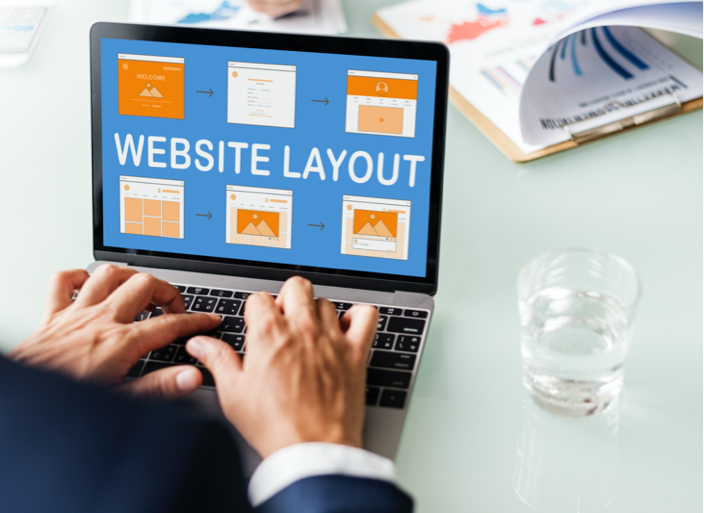For the majority of today’s small-to-medium-sized businesses (SMB), WordPress (WP) has taken the lion’s share of the market place when it comes to using this valuable software for the creation of websites.
Currently, WP accounts for nearly 70% of all the software-built websites created today with their closest rival landing at less than 7% of the market share in this category. For those with online stores, 22% of them are using a WordPress website to sell their products and services on the internet. WP is so popular it accounts for:
- Nearly 15% of the Top 100 Websites on the internet
- Over 500 websites are being built daily
- A total of over 75 million websites worldwide
Before we get into the many benefits of custom WordPress site design and its crucial components over the use of a pre-built template or a theme, let’s take a look at WordPress itself and some of its many valuable features.
What is WordPress?
In short, WordPress along with its competitors are classified as a Content Management System (CMS). They have a wide selection of software tools in place to make website construction easier and more accessible for today’s consumers and WP is the clear winner in the industry.
Users may be looking at WP as a CMS solution in two distinctly different ways. A webmaster uses WordPress as a platform to manage and run a more complicated website. They often access the admin panel to create, customize and manage the website’s content. However, most people use WordPress to sign up for a free blogging platform and post types of content according to the author’s individual desires.
What is a Template Compared to a WordPress Theme?

At first glance, the terms template and theme may seem interchangeable and that’s not the case. Simply put, a template is a predetermined layout of a single page on a site while a theme encompasses the entire design of a website. A template is part of the theme.
A WP theme is sometimes referred to as a style sheet and includes all the things you’d typically expect to see in the design process. This includes recurrent color schemes appearing on the home page and throughout the site inside headers and footers. The theme also addresses typography in the margins, indentations, line spacing, font faces, and styles.
What is a Widget?
The simplest definition of a widget is akin to a gadget, or as Mirriam Webster defines the word as “an unnamed article considered for purposes of a hypothetical example.” The dictionary goes on to define this term in the technical sense as, “a small software application that is designed to provide a specific piece of information (such as news, weather or traffic updates) or a specific function (such as taking notes or controlling another application) on demand.”
There are a number of these gadgets available on WordPress and they often appear in specific, predetermined widget areas inside themes. They’re commonly found in a sidebar, header, footer or somewhere on the home or front page. In most cases, they can be accessed and added from the WP appearance menu.
Widget Functions
By default, the core WordPress software comes with widgets that perform these types of functions with custom page types:
- Search – seen as a box usually with a magnifying glass as an icon
- Recent – will display either recent posts or comments
- Archives – links to previous posts and pages in WordPress
- Categories – separates and lists posts by category
- Calendar – lists posts by date
- Meta – a list of management links
- RSS – for the implementation of news feeds
You’re not limited to these widgets alone as others are literally tens of thousands of others provided through the use of plugins. It’s important to note that widgets are not plugins but some plugins contain widgets.
What are Plugins?
There are nearly 55,000 plugins available on the WP directory page that promise to “extend the WordPress experience” with thousands more available from third-party providers. Basically, WordPress plugins are apps that allow users to add new features and functions to the website much in the same way you would install them on a smartphone.
What Plugins Provide
Similar to widgets, plugins provide unique services that go above-and-beyond a blog or basic website design when you consider those that allow users to:
- Start an online store with an e-commerce platform
- Build a directory
- Post a job board
- Create a knowledge-based platform
- Construct a gallery for photography, images or other content
- Institute a Q&A platform
- Organize an online community
- Start a podcast
With thousands-upon-thousands of these types of options available on both WP and the internet, the possibilities are practically endless.
Why is Custom WordPress Site Design So Much Better?

So now that we’re well-versed in many of the valuable functions and features available on the WordPress platform, we’ll return to the matter at hand: Why is a custom WordPress site design better than using a template or theme? While they’re all viable options, templates and themes simply don’t compare to more valuable options available through customization.
Stand Out From the Crowd
Both templates and non-customized themes have a very average and ordinary feel to them since they’re implemented by so many users. Especially when it comes to templates, their cookie-cutter design has a stale appearance that delivers a real visual “blah” to users.
Marketing experts share statistics on the importance of investing in effective website design since 94% of the user’s first impression about a site is design-related. Furthermore, 75% of visitors report making a judgment about the credibility of a business based on the design of their website. In short, appearance, layout, and design matter a great deal.
Improved User Experiences
Again, templates simply don’t offer much in the way of options for website visitors often leading to poor user experiences (aka UX). Along with a poor design, other reasons users are often bouncing from sites include poor navigation, broken links, and a lack of attention-getting content.
With customization and personalization methods available in website construction, there are a number of ways to better connect with consumers that aren’t available in templates. Simple pathways and processes in pre-planned layouts won’t hold the attention of today’s users who are looking for more than old-school methods commonly found on more traditional sites.
Better SEO Results and Higher Google Rankings
Prebuilt themes have a great deal of functionality but most of their many features won’t be used by a small business.. There may be technology in place that makes these sites a heavy load leading to slower page load times. This will not only drive users away, but this lack of performance leads to poor SEO results and reduces rankings.
A custom WordPress site design is lighter and more efficient delivering only the necessities of what a small business requires from its website. This provides better user experience and more effective interaction with visitors.
Higher Conversion Rates
All of the previously mentioned techniques will ultimately lead to higher conversion rates. Custom designs also have the ability to place call-to-action (CTA) methods in more optimal locations to better capture a viewer’s attention and leading them to the desired results from a website.
The use of more effective digital strategies including the construction of marketing funnels are options not included with most templates or themes. There are many valuable sales and advertising possibilities and opportunities that are unavailable without the use of customized additions.
For example, the use of effective digital strategies like the construction of marketing funnels is an options that is often not included with templates or themes. This is but one example of the plethora of internet sales and advertising possibilities that are unavailable without the use of third-party integrations that can be expensive and time-consuming. A custom website will have marketing requirements built in. This will save time and money.
Increased Credibility
Along with the importance of a better designed, more efficient website, users are looking for increased credibility of businesses on the internet. To be fair, one way to accomplish this task is through posted connections to social media platforms which are almost always a part of templates and themes. The appearance of these highly-recognized sites shows a website has nothing to hide and is transparent.
However, users are also looking for third-party validation from other outside sources that prove the website is credible and trustworthy. Often referred to as “trust-badges,” these seals of approval range from a stamp showing the site is protected by anti-virus software or is listed as being accredited by the BBB (Better Business Bureau). Badges? Yes, you do need trust badges placed somewhere in plain sight and they’re easily added through a custom design.
Custom WordPress Site Design – The Best Choice for Small Businesses
As you can see, there are so many advantages when choosing a custom WordPress site over a theme or template, especially for small businesses. In summation, remember a more visually stunning website will attract and retain more users along with:
- Improving user experience and keeping them better connected to your brand, products and/or services
- Achieving more successful SEO results leading to higher Google rankings and more online recognition
- Delivering higher conversion rates, an increase in sales, more leads and better responses for a call to action from users
- Obtaining increased credibility in order to gain trust with today’s consumers who are seeking greater reliability, more confidence, and faith from businesses online
Get Custom WordPress Site Design from Red8 Interactive
Take advantage of everything a customized WordPress website has to offer and hire a professional and reliable designer. Please contact us via email today or reach out to (415) 906-2411 to discuss your individual needs.
With over 10 years of experience building and developing websites on the WordPress platform, we’ll ensure your site is top-notch and exactly what you’re looking for your business.

Author: James Hipkin
CEO, Managing Director
James brings over 30 years of professional sales, marketing, and marketing consultation services to the table. Serving global brands along with small businesses, Hipkin leads a highly-skilled team of full-time developers, producers, and project managers who are committed to your success.
An excellent communicator and inventive problem-solver, his creative vision and bottom-line sensibility have proven successful at building productive, long-term partnerships with both employees and clients.

